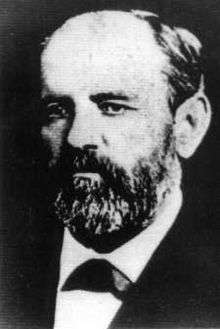Mathew Ector
| Mathew Duncan Ector | |
|---|---|
 | |
| Born |
February 28, 1822 Putnam County, Georgia |
| Died |
October 29, 1879 (aged 57) Tyler, Texas |
| Buried at | Greenwood Cemetery, (Harrison County, Texas) |
| Allegiance |
|
| Service/branch |
|
| Years of service | 1861–65 |
| Rank |
|
| Unit | 3rd Texas Cavalry |
| Commands held |
14th Texas Cavalry Ector's Brigade |
| Battles/wars | American Civil War |
Mathew Duncan Ector (February 28, 1822 – October 29, 1879) was an American legislator, Texas jurist, and a general in the Confederate States Army during the American Civil War.
Early life
Ector was born in Putnam County, Georgia, to Hugh and Dorothy Ector. The family moved to Greenville, Georgia, soon after. He was educated at Centre College in Danville, Kentucky, before reading for law in the office of Hiram B. Warner. Ector served a single term in the Georgia state legislature in 1842 before moving to Texas in 1850.
Ector was admitted to the bar in 1851 in Henderson, Texas, and began the practice of law. That same year he married Letitia Graham, who died in 1859. In 1856 he was elected to the Texas House of Representatives from Rusk County.
In Atlanta in 1864, he wed Sallie P. Chew. One daughter of this marriage, Anne Ector, became the wife of Louisiana Governor Ruffin Pleasant (1916–1920).
Civil War
When the Civil War broke out, Ector enlisted as a private in the 3rd Texas Cavalry of the Confederate army. He was soon elected lieutenant. He served as adjutant to Brig. Gen. Joseph L. Hogg and saw action in Texas and Arkansas. He was promoted to colonel and given command of the 14th Texas Cavalry. Then in August 1862, he was promoted again to brigadier general and assigned command of a brigade. He fought at the Battle of Murfreesboro in Tennessee and Chickamauga in Georgia. He and his men were then assigned duty in Mississippi, returning in time for the Atlanta Campaign in the summer of 1864.
Ector's military career essentially ended on July 27, 1864, in fighting near Atlanta, Georgia. He was severely wounded and his left leg was amputated at the knee. The war ended before his recovery was complete, although he did travel to Mobile, Alabama, to assume command of the defenses there late in early 1865.
Postbellum
Matthew returned to Texas, and moved to Marshall in 1868. After serving in several local judicial roles, he was elected to the Texas Court of Appeals in 1875, serving until his death in Tyler, Texas, in 1879. His remains were returned to the Methodist church in Marshall, and he in buried in the Greenwood Cemetery there.
Honors
Ector County, Texas, is named for him.[1]
See also
Notes
- ↑ Gannett, Henry (1905). The Origin of Certain Place Names in the United States. Govt. Print. Off. p. 114.
References
- Eicher, John H., and David J. Eicher, Civil War High Commands. Stanford: Stanford University Press, 2001. ISBN 978-0-8047-3641-1.
- Sifakis, Stewart. Who Was Who in the Civil War. New York: Facts On File, 1988. ISBN 978-0-8160-1055-4.
- Warner, Ezra J. Generals in Gray: Lives of the Confederate Commanders. Baton Rouge: Louisiana State University Press, 1959. ISBN 978-0-8071-0823-9.
External links
- Mathew Duncan Ector from the Handbook of Texas Online
- Entry about Mathew Duncan Ector from the Biographical Encyclopedia of Texas published 1880, hosted by the Portal to Texas History.
- Photo